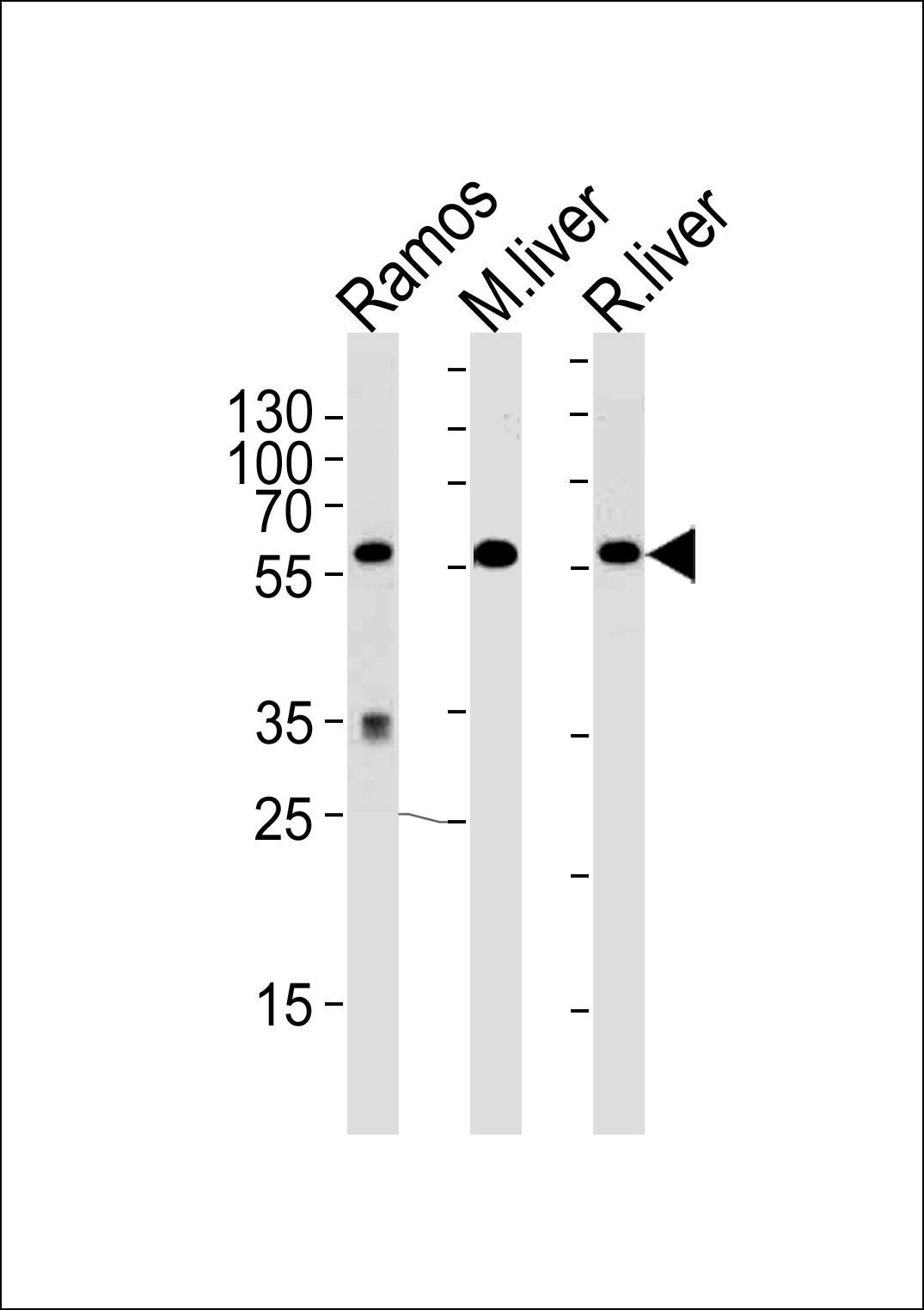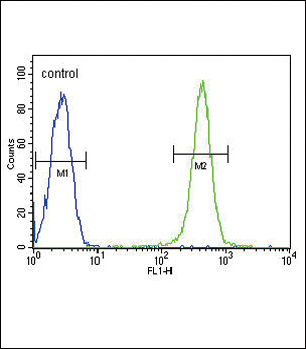GPI Antibody (C-term)
Affinity Purified Rabbit Polyclonal Antibody (Pab)
- SPECIFICATION
- CITATIONS: 2
- PROTOCOLS
- BACKGROUND

Application
| WB, FC, E |
|---|---|
| Primary Accession | P06744 |
| Other Accession | Q4R591 |
| Reactivity | Human, Mouse |
| Predicted | Monkey |
| Host | Rabbit |
| Clonality | Polyclonal |
| Isotype | Rabbit IgG |
| Calculated MW | 63147 Da |
| Antigen Region | 445-473 aa |
| Gene ID | 2821 |
|---|---|
| Other Names | Glucose-6-phosphate isomerase, GPI, Autocrine motility factor, AMF, Neuroleukin, NLK, Phosphoglucose isomerase, PGI, Phosphohexose isomerase, PHI, Sperm antigen 36, SA-36, GPI |
| Target/Specificity | This GPI antibody is generated from rabbits immunized with a KLH conjugated synthetic peptide between 445-473 amino acids from the C-terminal region of human GPI. |
| Dilution | WB~~1:1000 FC~~1:10~50 |
| Format | Purified polyclonal antibody supplied in PBS with 0.09% (W/V) sodium azide. This antibody is purified through a protein A column, followed by peptide affinity purification. |
| Storage | Maintain refrigerated at 2-8°C for up to 2 weeks. For long term storage store at -20°C in small aliquots to prevent freeze-thaw cycles. |
| Precautions | GPI Antibody (C-term) is for research use only and not for use in diagnostic or therapeutic procedures. |
| Name | GPI {ECO:0000303|PubMed:2387591, ECO:0000312|HGNC:HGNC:4458} |
|---|---|
| Function | In the cytoplasm, catalyzes the conversion of glucose-6- phosphate to fructose-6-phosphate, the second step in glycolysis, and the reverse reaction during gluconeogenesis (PubMed:28803808). Besides it's role as a glycolytic enzyme, also acts as a secreted cytokine: acts as an angiogenic factor (AMF) that stimulates endothelial cell motility (PubMed:11437381). Acts as a neurotrophic factor, neuroleukin, for spinal and sensory neurons (PubMed:3352745, PubMed:11004567). It is secreted by lectin-stimulated T-cells and induces immunoglobulin secretion (PubMed:3352745, PubMed:11004567). |
| Cellular Location | Cytoplasm. Secreted |

Provided below are standard protocols that you may find useful for product applications.
Background
GPI belongs to the GPI family whose members encode multifunctional phosphoglucose isomerase proteins involved in energy pathways. The protein encoded by this gene is a dimeric enzyme that catalyzes the reversible isomerization of glucose-6-phosphate and fructose-6-phosphate. The protein functions in different capacities inside and outside the cell. In the cytoplasm, the gene product is involved in glycolysis and gluconeogenesis, while outside the cell it functions as a neurotrophic factor for spinal and sensory neurons. Defects in this gene are the cause of nonspherocytic hemolytic anemia and a severe enzyme deficiency can be associated with hydrops fetalis, immediate neonatal death and neurological impairment.
References
Shih, W.L., et al. Cancer Lett. 290(2):223-237(2010)
Davila, S., et al. Genes Immun. 11(3):232-238(2010)
Araki, K., et al. J. Biol. Chem. 284(47):32305-32311(2009)
Tsutsumi, S., et al. Int. J. Oncol. 35(5):1117-1121(2009)
Funasaka, T., et al. Cancer Res. 69(13):5349-5356(2009)
Yanagawa, T., et al. J. Biol. Chem. 280(11):10419-10426(2005)
Haga, A., et al. Biochim. Biophys. Acta 1480 (1-2), 235-244 (2000)
If you have used an Abcepta product and would like to share how it has performed, please click on the "Submit Review" button and provide the requested information. Our staff will examine and post your review and contact you if needed.
If you have any additional inquiries please email technical services at tech@abcepta.com.














 Foundational characteristics of cancer include proliferation, angiogenesis, migration, evasion of apoptosis, and cellular immortality. Find key markers for these cellular processes and antibodies to detect them.
Foundational characteristics of cancer include proliferation, angiogenesis, migration, evasion of apoptosis, and cellular immortality. Find key markers for these cellular processes and antibodies to detect them. The SUMOplot™ Analysis Program predicts and scores sumoylation sites in your protein. SUMOylation is a post-translational modification involved in various cellular processes, such as nuclear-cytosolic transport, transcriptional regulation, apoptosis, protein stability, response to stress, and progression through the cell cycle.
The SUMOplot™ Analysis Program predicts and scores sumoylation sites in your protein. SUMOylation is a post-translational modification involved in various cellular processes, such as nuclear-cytosolic transport, transcriptional regulation, apoptosis, protein stability, response to stress, and progression through the cell cycle. The Autophagy Receptor Motif Plotter predicts and scores autophagy receptor binding sites in your protein. Identifying proteins connected to this pathway is critical to understanding the role of autophagy in physiological as well as pathological processes such as development, differentiation, neurodegenerative diseases, stress, infection, and cancer.
The Autophagy Receptor Motif Plotter predicts and scores autophagy receptor binding sites in your protein. Identifying proteins connected to this pathway is critical to understanding the role of autophagy in physiological as well as pathological processes such as development, differentiation, neurodegenerative diseases, stress, infection, and cancer.


